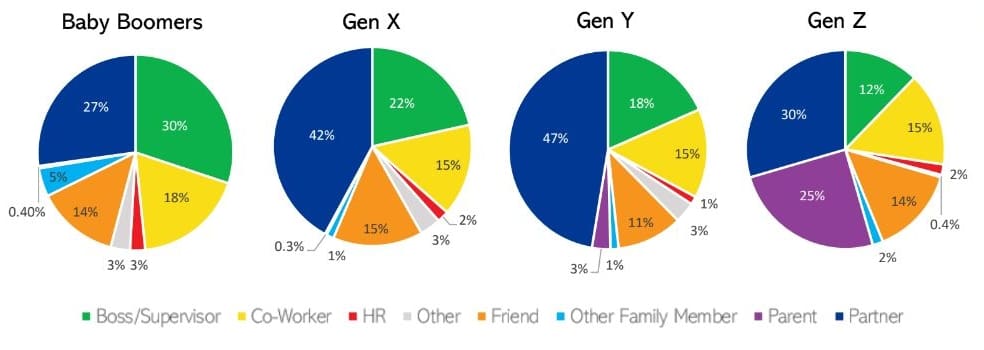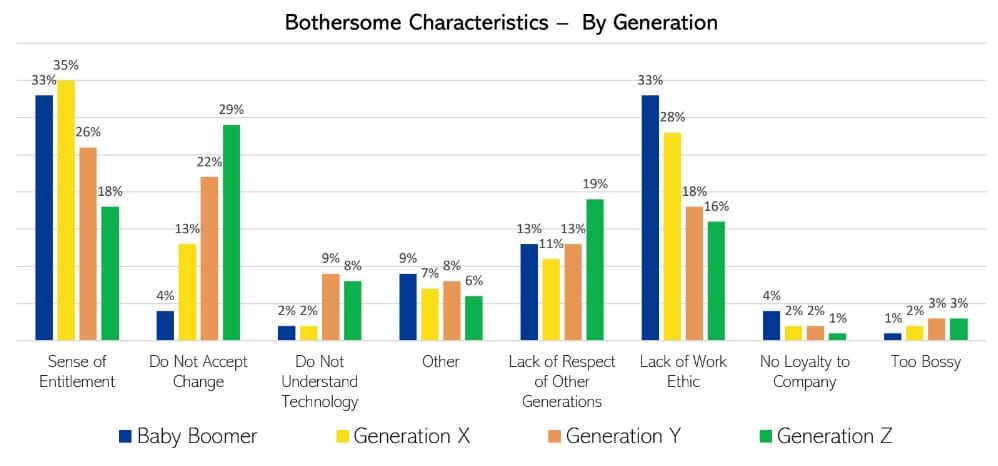What the Generations Want at Work – Part 2: Insights for HR, Managers, & Teams
Last Updated on March 3, 2022 / Employee Relations, HR Strategy

Having many generations working together is not a new concept, but that doesn’t mean it’s always smooth sailing. How should managers be prepared to lead and support multi-generational teams? How could understanding generational preferences help employees to better communicate and work together?
With a desire to answer these questions and to learn if changes had occurred in the generational work and life preferences that were identified in Bridging the Generation Gap, Strategic HR conducted an extensive Survey on the Generations.
In our previous article, What the Generations Want – Part 1, we shared our key survey findings on each generation’s perspectives on Job Search, Workplace Preferences, and Motivation.
In this edition of Emerging Issues in HR, we will share a few more of our key survey findings and recommendations about:
- Factors that impact overall happiness across the generations
- Who they turn to when they’re unhappy at work (…and it’s not who you think!)
- Communication preferences
- Bothersome characteristics of other generations
- What each generation wants you to know about them
For full (and free) access to all of the multi-generational lessons learned from our research and our recommendations, download our Generations at Work Insights.
Top Factors Affecting Personal Happiness Across Generations
Fortunately, we’re living at a time when there is a broad awareness and appreciation of the direct impact that our personal well-being can have on how effective we are in our professional and personal lives. Given that, we wanted to understand the factors that contributed to each generation’s personal happiness. When looking at the most influential and least important factors of personal happiness once they reached adulthood (18 years old), we learned the following:
Top 5 Happiness Factors Across All Generations:
- Financial Security
- Family’s Happiness and Well-Being
- Quality Friendships
- Leisure Time Availability / Quality
- Job Satisfaction
Least Important Factors Affecting Happiness Across All Generations:
- School Involvement / Activities
- Community / Political Involvement
- Political Climate
- Economic Conditions
- World Events / Feelings of Safety
Employers take note! The data emphasized the importance of Job Satisfaction, as it was double that of Job Security among all generations – a reminder that job enjoyment is more important than tenure.
Who do the Generations Turn to When Unhappy at Work?
When something goes wrong or is consistently bothersome at work, it’s common for people to talk about it with others. We wanted to understand who the generations reached out to for help when they were unhappy about their jobs. Here we found it’s just as interesting to see who they DID seek help from as who they DID NOT.
The top three supports that all generations leaned on for help with work troubles were Spouse/Significant Other, Boss/Supervisor, and Co-workers, except for Generation Z which preferred talking with a parent more than their boss. Many might be surprised to learn that Human Resources were among the least likely to be asked for help across all generations.

Key Takeaways To Address Unhappy Workers:
- Be sure to train managers and supervisors on how to deal with conflict and dissatisfied employees as they are among the most likely to be approached for help.
- Many issues can be solved when you have the right people in the conversation. Remind employees who they can reach out to within your organization whenever they are feeling unhappy about their jobs. It’s important for that individual, typically an HR team member,
to approach the situation with empathy, an open mind, and keen listening skills. - Consider looking for ways to share information and develop relationships with spouses/significant others (and parents for your Gen Z’s) as this might help them to better understand the company’s mission, vision, goals, and culture.
Communication Preferences of Generations at Work
 The key to success for any team is communication. Teams that do it well tend to thrive; while those that struggle to communicate effectively not only risk not meeting their goals, but they also risk losing high-performing team members who are drawn to efficacious teams.
The key to success for any team is communication. Teams that do it well tend to thrive; while those that struggle to communicate effectively not only risk not meeting their goals, but they also risk losing high-performing team members who are drawn to efficacious teams.
To learn about how they like to communicate at work, we asked survey participants to rank their preferred work communication methods. In an increasingly technological world, it may be surprising to learn that one-on-one discussions ranked number one as the preferred mode of communication across the generations, with email being their second choice for work communication. It’s important to note that one-on-one discussions include both in-person as well as virtual one-on-one meetings using tools such as Microsoft Teams, Google Meet, Skype, etc.
The least preferred work communication tools among the generations were text and chat. While this might surprise you given that if asked about their preferred communication methods in their personal life, many would prefer text and chat. However, when applied to many work settings, text and chat don’t lend themselves to the same benefits as they do in personal life. This could be attributed, in part, to the difficulty of keeping track of these types of communication because neither text nor chat can be marked unread or flagged to be addressed at a more opportune time after being read. In addition, due to the typically short length of text and chat, it is easy to misinterpret the writer’s “voice” or emotional intent of the message.
Key Takeaways for Effective Communication Across the Generations
Choose your communication tools carefully based on what you need to accomplish and who you’re communicating with, and be sure to share your organization’s communication expectations. Consider the following:
- Choose a one-on-one (in-person or virtual) meeting if the topic requires a fair amount of discussion. Combining the verbal and nonverbal cues will be helpful in this scenario.
- Use emails when you need to provide information and/or ask for specific information or tasks to be completed. Emails are also a great documentation tool to confirm you’re on the same page and to track history and progress.
- Limit the use of text and chat to when you need an immediate (and easy) response that doesn’t require follow-up if the message is missed.
Bothersome Characteristics of Other Generations at Work
We’ve all heard the grumblings between generations. Maybe a team member’s dismissive attitude is blamed on their age, or an individual’s challenge with technology is chalked up to their generation. But we wanted to dig into the specific reasons why different generations might find certain behaviors bothersome about their co-workers and generational counterparts.

Key Takeaways to Avoid Generational Annoyances
- “Sense of Entitlement” is found among the top 2 bothersome characteristics across all generations.
- Baby Boomers, Gen X, and Radio babies were highly bothered by others’ “Lack of work ethic,” while Gens Y and Z were highly annoyed by those who “Do not accept change.”
- Knowing and respecting the “hot buttons” of other generations can help us to avoid negative encounters and work more effectively together.
What Each Generation Wants You to Know
 If you want to understand someone, sometimes all you need to do is ask. So, we did!
If you want to understand someone, sometimes all you need to do is ask. So, we did!
We asked our survey participants to share one thing that they would like other generations to know about theirs. We have compiled major themes and common comments to learn about each generation from their perspectives.
You can download Generations at Work Insights for the full picture of what the generations want you to know, but in the meantime, we’ll share one quote from each generation below:
“We are hardworking, have a strong work ethic, value integrity, and are loyal.”
“We have an entrepreneurial, collaborative, and innovative approach. We don’t conform to company policies – we evolve them.”
“Work is not a job to us, but part of our self-identity. We want to be valued for our contribution and making a difference.”
“We will bring CHANGE to the workforce like no other generation, bringing innovation, new work styles, and diversity.”
We are thankful for our survey participants who shared their honest thoughts, feedback, and experiences with us. They helped to shed light on many important themes that we all should be aware of and can benefit from in both our professional and personal lives. The more the generations can understand and empathize with each others’ perspectives and preferences, the better positioned we all are to communicate and work well together to achieve more.
If your organization would like to optimize how the different generations of your workforce perform together, you can learn more about our Generations in the Workplace Training or Contact Us about how we can customize generations training for you.



